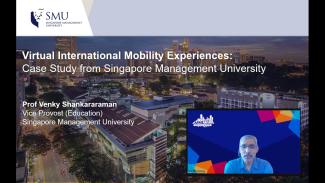
The Singapore Management University (SMU) aspires to have 100% of its students embark on at least one global experience before graduating. When Covid-19-related safety concerns and travel restrictions resulted in the suspension of overseas mobility programmes, SMU nevertheless continued to offer students a gamut of enriching global exposure experiences. This was made possible thanks to a strong network of overseas partner institutions which it had collaborated closely with to develop and deliver virtual alternatives.
These points were underscored by SMU’s Vice Provost (Education), Professor Venky Shankararaman, who was speaking at the Asia-Pacific Association for International Education (APAIE) Annual Conference and Exhibition. Held virtually from 27 to 31 March, this year’s conference focused on the theme of “Brave New Realities for Higher Education in the Asia Pacific”.
Prof Shankararaman was participating at the Conference in line with SMU’s strategic priority area of “Growth in Asia”, where the University sought to offer a deep understanding of Asia’s economy, polity and society. Addressing professionals in the international education sector who had joined the Conference to network and learn about new developments, he presented a case study on SMU’s virtual international mobility experiences on 30 March 2022.
Prof Shankararaman, who is also an APAIE board member, shared that SMU convened a team to design a framework to enable and guide students in achieving global exposure learning outcomes amid the challenges brought on by the global pandemic. Implemented in April 2021 when overseas travel was still suspended, the Global Exposure Framework recognises three categories of activities that develop the skills, knowledge, attitudes and networks to help students to become global-ready. Category A comprises immersive overseas activities requiring physical travel, while Category B activities are remote but involve considerable two- or multi-way engagements and are conducted over a few days. Category C consists of limited two- or multi-way engagements that may be completed in a single sitting or day.
In a separate session on the same day, Prof Shankararaman presented a Regional Report on Singapore, which gave the international audience insights into how Singapore universities had worked on minimising disruptions to education delivery and student activities during the pandemic.
“SMU’s three-month asynchronous finance programme is a case in point of how technology could be leveraged to allow effective learning at one’s own pace and convenience, thus reducing scheduling barriers often faced by busy working professionals,” commented Prof Shankararaman. He was speaking in the context of Singapore universities’ concerted efforts to support the nation’s long-term vision for a pervasive culture of lifelong learning.